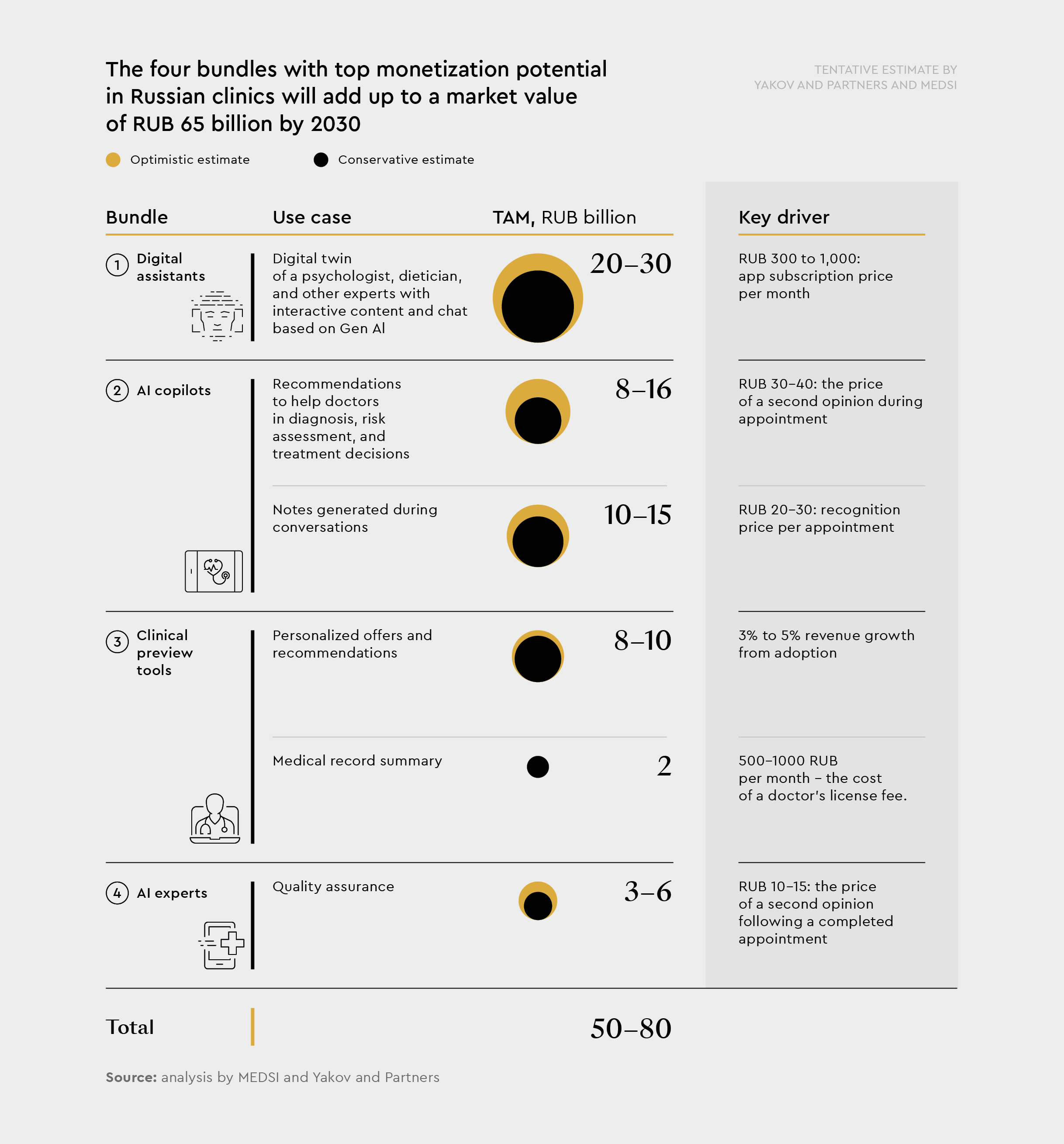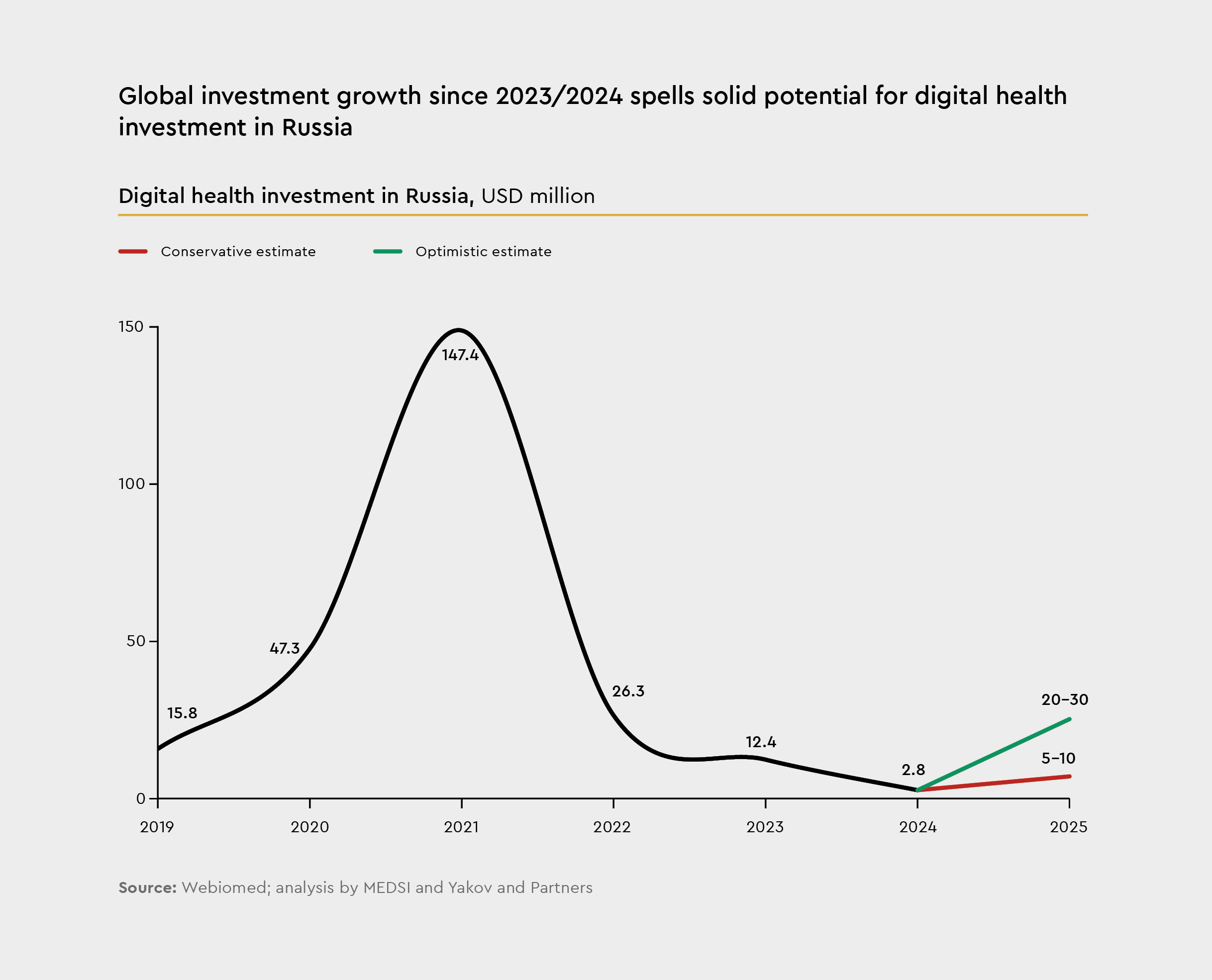Yakov and Partners experts together with MEDSI have looked into the present and future of digital technologies in healthcare. According to the study “Artificial intelligence in healthcare,” the Russian health AI market is set to grow more than six-fold by 2030, soaring to RUB 78 billion from RUB 12 billion in 2024.
This upside movement is not only a national trend: the increasingly important role of AI in healthcare is vindicated by global developments. Health AI was a USD 22 billion market globally in 2024, and the joint study estimates that it will reach USD 130–160 billion by 2030, with healthcare accounting for about 8% of the total AI market.
The industry's positive trend is largely due to the fact that AI has become a key growth driver that enables new opportunities in healthcare, the experts say. Today's AI systems are able to transform doctor-patient interactions, including support, care, and medical assistant functions. Artificial intelligence can also process health records to extract important information that was earlier unstructured and difficult to access, including family medical history or patient's complaints in a free format. This information can be further transformed into a structured dataset and used to train models, opening the way to more advanced predictive modeling and a new page in the history of personalized healthcare, the authors of the study say.
As part of the joint study, the Yakov and Partners expert team conducted interviews with doctors from MEDSI clinics to make a comprehensive assessment of over 80 use cases for AI in healthcare. The analysis revealed four priority areas with the highest adoption potential for Russian healthcare providers: digital assistants, clinical preview tools, AI copilots, and AI experts. Physicians believe these solutions can be of great use, helping improve the efficiency of clinical practice and reducing appointment time. Also, they have significant commercialization potential.
"In our estimation, these product groups have the potential to build up a market worth RUB 65 billion in Russia by 2030. By adopting AI tools, medical institutions can raise operational efficiency, improve patient satisfaction, and significantly reduce healthcare costs"
Alexander Pilipchuk, Vice President, member of the Board, and Director of Strategy and Digital Transformation at MEDSI
The study team also pinpointed two most promising areas and developed MVP prototypes for them. One of these products is a tool that summarizes medical history: integrated into the health information system, it enables doctors to get all essential patient information in a concise format in a matter of minutes (episodes of the disease, significant test abnormalities, identified pathologies, and other clinically important parameters).
"The product is showing significant results early in the internal clinical trials phase. The doctors reported a reduction in appointment time of up to 10%. The system is able to extract over 500 unique parameters that have not been accessible for analysis before. This data opens up new prospects for AI-powered predictive model development. Internal surveys confirm that the solution will generate considerable interest: 92% of doctors said the system has significant potential and expressed readiness to use it later on"
Maksim Bolotskikh, Partner at Yakov and Partners
The second product is an emotional regulation app called Psychological Assistant. The app is already up and running, it is used by more than 7,000 MEDSI staff members. The tool features an AI-powered mental health chatbot and over 60 tried and true techniques and exercises for anxiety control, as well as training videos from experts in the field.
"We hope that impacts from the products we've developed will spark interest in AI and digital healthcare among developers and investors. We also hope to encourage healthcare providers to actively experiment with and implement such innovations. The market is now entering its mature stage, as focus is shifting to projects with real clinical and commercial impact. Sixty-four percent of medical institutions that have adopted products powered by generative AI have already seen a positive return on investment, which evidences the effectiveness of such technologies. Similar initiatives can help improve operational efficiency and bring the quality of medical care to a new level, providing companies with strong competitive advantage for the next 3–5 years"
Marina Dorokhova, Director at Yakov and Partners
The authors of the study identified two potential scenarios that the Russian digital healthcare market may follow in 2025. In the conservative scenario, the current trend continues, with developers making very limited inroads into the healthcare market and investment staying within the range of USD 5 to 10 million (about RUB 450–900 million), somewhat above the 2024 numbers.
The optimistic scenario will not work unless new players come on the scene able to adapt AI products to the needs of healthcare providers and integrate the solutions into the clinical processes. If this scenario plays out, investment may reach USD 20–30 million (about RUB 1.8–2.7 billion), surpassing the 2023 level.
Russia’s healthcare sector largely faces the same issues that are commonly encountered in international practice, namely: large volumes of documentation, outdated healthcare IT systems, and staff shortages. All this speaks to the fact that raising operational efficiency is a strategic task, and technology is a prime vehicle to tackle it, the experts say.
"Implementing AI in healthcare is especially challenging due to the critical nature of patient health and safety. Long market entry periods, high costs, and stringent quality requirements compel developers to closely collaborate with healthcare providers. More than half of clinics in foreign markets plan to forge partnerships with developers – and Russia needs such projects, too. They will pave the way for AI solutions that will significantly enhance the quality of medical care"
Nikita Vlasov, Associate at Yakov and Partners
In collaboration with MEDSI, Yakov and Partners experts carried out a broad-based survey to determine the AI products that are most likely to be implemented by Russian healthcare organizations. They surveyed over 1,000 MEDSI clients, and over 70% of them expressed readiness to use AI agents to receive psychological support. The experts also conducted in-depth interviews of doctors with 50 different skill sets and reviewed more than 800 healthcare startups worldwide.





